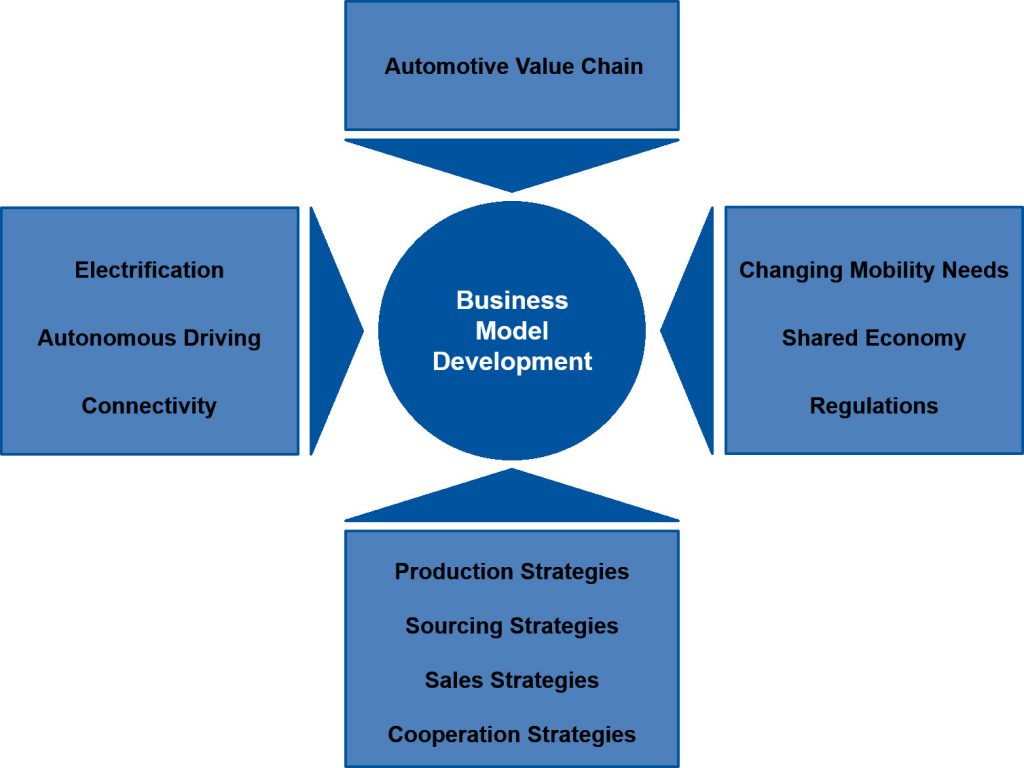International Automobile Management
| Cycle | Summer Term |
| Language | English |
| Course Units | 4 SWS |
| Credits | 5 ECTS |
| Course Limit | 40 Participants |
| Examination | Class test (75%), Paper (25%) |
| Lecturer | Dr. rer. pol. Garnet Kasperk |
The automotive industry is one of the most important industries not only for Germany but for many other industrialized as well as developing countries.
The automotive industry is facing various game-changing trends that all need to be managed at the same time. Rulebreaking developments challenge automotive companies: the electrification of vehicles, connectivity and autonomous driving as well as changing mobility needs leading to shared and circle economies.
This course will enable students to understand the major challenges in the industry and analyze alternative strategies for automotive companies to design their future.
Drivers and impacts of changing mobility needs, different propulsion technologies, autonomous driving and connectivity are covered in the lecture.
As organizations’ ability to proactively design their future is increasingly determined by open innovation processes and a credible organizational culture, these items are topics as well.
Strategic ideas along the value chain – covering production as well as sales strategies – will be discussed using theoretical instruments and case study based industry insights.

Additional information on this course and the application procedure can be obtained on CAMPUS Office.
Unternehmensethik: Die deutsche Automobilindustrie – ethisch blind, aber lernfähig?
| Cycle | Summer Term (starting SS 2018) |
| Language | German |
| Course Units | 4 SWS |
| Credits | 5 ECTS |
| Course Limit | 20 Participants |
| Examination | Project report (60%), Presentation (40%) |
| Lecturer | Dr. rer. pol. Garnet Kasperk Dr. oec. Karin Knottenbauer |
Eine Reihe von Skandalen haben in den vergangenen Jahren Automobilunternehmen weltweit erschüttert. Rückholaktionen, Dieselskandal, Kartellverdacht werden beispielsweise öffentlich diskutiert. Selten sind die eigentlichen Ursachen des teilweise unmoralischen Verhaltens Thema qualifizierter Beiträge.
Warum verhalten sich Personen in Unternehmen der Automobilindustrie eigentlich unmoralisch? Wie entsteht ethische Blindheit in Unternehmen, in denen viele engagierte Menschen nach guten Lösungen streben?
Auf Basis von aktuellen Fallstudien sowie psychologischen und institutionellen Ansätzen werden Gründe für unmoralisches Verhalten erörtert. Ethische und unternehmensethische Theorien liefern Grundlagen für neue Konzepte der moralischen Lernfähigkeit und ihrer institutionellen Verankerung, die in der Praxis gerade in der Entstehung sind. Fallstudienbasiert und teamorientiert werden Studierende in Bezug auf den Entstehungsprozess unmoralischer Entscheidungsstrukturen sensibilisiert und entwickeln neue Lösungsansätze zu der dringlichen Herausforderung: wie werden Unternehmen der Automobilindustrie ethisch lernfähiger?
Weitere Informationen zu der Veranstaktung und dem Anmeldeprozess können unter CAMPUS Office eingesehen werden.
